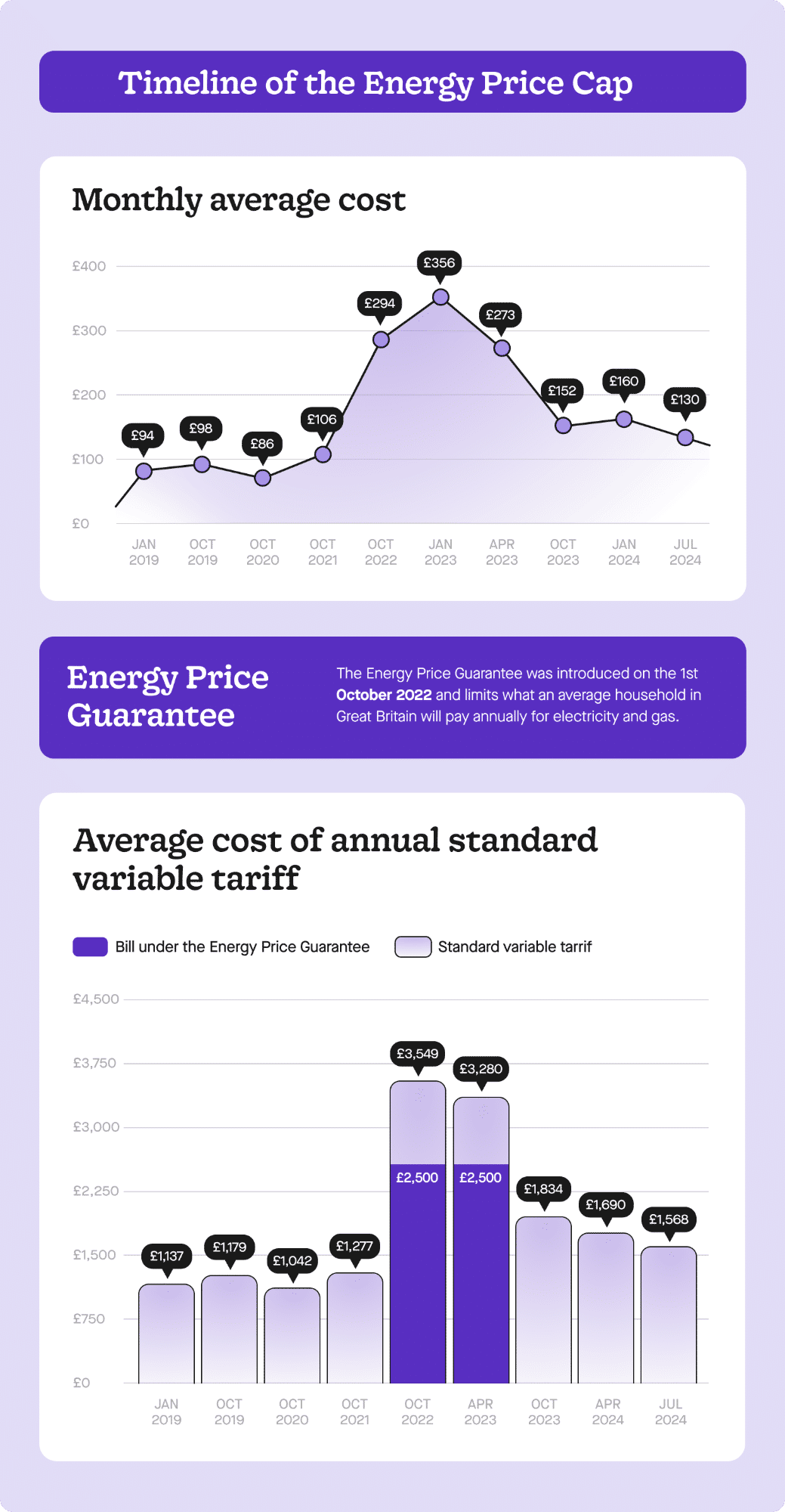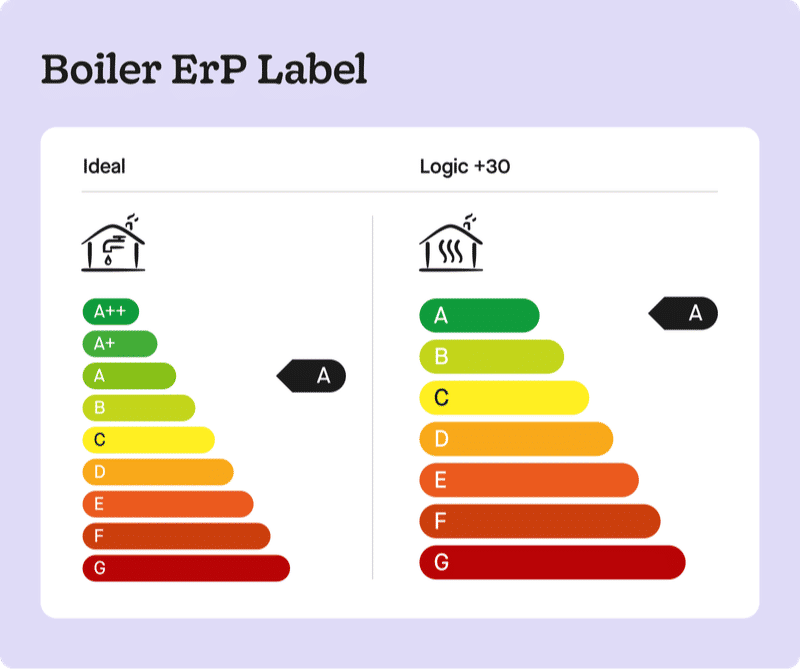Are you wondering how effective the energy price cap has been? See the official timeline in our analysis of the figures...
The energy price cap is backstop protection from the government, calculated by Ofgem. The price cap limits the rates a supplier can charge for their default tariffs.
The first energy price cap for default energy tariffs, also called standard variable tariffs (SVTs), was introduced by Ofgem on 1st January 2019.
According to Ofgem, for the period 1 January to 31 March 2026, the cap for a “typical” dual-fuel household paying by Direct Debit is set at £1,758 per year, which is a 0.2% increase (£3) from the previous cap of £1,755 (1 October to 31 December 2025).
PS Are you wondering what impact the new price cap will have on the daily running costs of your household appliances? See the full breakdown in pence per hour here.
History of the Energy Price Cap
First established in January 2019, the energy price cap has seen some volatility over the years.
Below is an infographic showing the history of the energy price cap and how it's changed over time, showing both the annual change and the change in the monthly average cost.

Image released under Creative Commons. If used, please attribute it by linking to: heatable.co.uk
How is the energy price cap calculated?
Ofgem calculates the energy price cap by using the average gas and electric usage statistics each year in the United Kingdom, which are 12,000 kWh per year for gas and 2,900 kWh per year for electricity.
Why was the energy price cap introduced?
The energy price cap was first introduced in response to rising concerns over fuel poverty and in order to protect consumers from volatile and in recent times - skyrocketing wholesale energy prices.
The price cap protects over 11 million household energy customers, providing stability and ensuring they pay a fair price for their energy bills.
Essentially, it prevents energy suppliers from charging whatever they want per kWh of energy used, while at the same time taking into account the real wholesale price, to prevent suppliers from purchasing energy at a higher price than they are selling.
How frequently is the price cap changed?
The energy price cap is reviewed and updated by Ofgem twice each year. However, the public typically knows what the changes will be in February and August, two months prior to the changes actually taking effect.
For instance, the price cap announced in February doesn't actually take effect until April, while the announcement made in August doesn't take effect until October.
Why are energy prices increasing?
Unfortunately, with the current energy crisis looming, the number of UK households in poverty as a result of their energy bills is set to treble and reach an unprecedented 6 million when the current energy price cap is abolished on October 1st.
The cause of the increase is thought to be multifaceted, with a global rebound in post-lockdown energy demand, a particularly cold winter that left stores depleted, as well as a recent fire at a key line between France and the UK.
More recently, the conflict in Ukraine and tension with Russia have also contributed, worsening the energy crisis further.
Surprisingly the UK only gets around 3% of its gas from Russia, yet it still has a major impact on global oil and gas prices. If you are interested in learning more, check out our guide on where the UK gets its gas from.
Currently, fuel poverty is estimated to affect around 2 million people in the UK, but a recent report by Foundations has found that this figure is likely to jump to 6 million overnight when the new cap is introduced on the 1st of April.
Unfortunately, fuel poverty isn't simply a financial issue and it has far-reaching health and well-being implications.
What Can You Do to Keep Energy Bills Low?
Make the most of your energy tariff
If your home uses electric heating or an electric boiler, or you have electric appliances that consume a lot of energy, then you should check what type of tariff you are on.
If you are on an economy 7 or economy 10 tariff, the price of electricity is typically much cheaper during off-peak hours, so it’s helpful to try and limit your use to this window.
This is particularly helpful if your home uses an immersion heater to heat water. You can easily set your thermostat timer to reap the rewards of certain energy tariffs.
For example, customers on the Economy 7 tariff can set their timer to only switch the heater on during off-peak hours.
You can also insulate your immersion heater; in which case your water will stay hot for several hours after it has been turned off.
You can easily find out the tariff you are on by asking your energy provider.
Compare energy quotes
Due to the current energy crisis, there isn't as much opportunity to change your current energy tariff to a more competitive deal, but it may still be worth checking.
However, many energy suppliers have closed down and many others continue to refuse to take on new customers at present.
In usual circumstances comparing energy, quotes can be one of the quickest ways to save money on both your gas and electricity bills.
Check out our comprehensive list of energy-saving tips here.
Install a new energy-efficient boiler

If your combi boiler is over 10 years old, it’s very likely to be G-rated under the ErP (Energy Related Products Directive) boiler rating system, meaning it could be less than 70% efficient.
According to the Energy Saving Trust installing a boiler that is a modern A-rated upgrade has a significant advantage:
By replacing your old boiler in for a modern boiler, you could save as much as £380 and a whopping 1,500kg of carbon emissions a year.
The good news is that there are various government grants available to help you make upgrades, as well as boiler finance such as:
Improving your insulation
Upgrading your boiler and appliances with an ECO Grant
Installing solar panels or other renewables
Even if you aren’t entitled to a grant, by investing in any of the above types of green upgrades, like one of the best combi boiler models, you can recoup the costs over time via the savings you can make on your energy bills.





